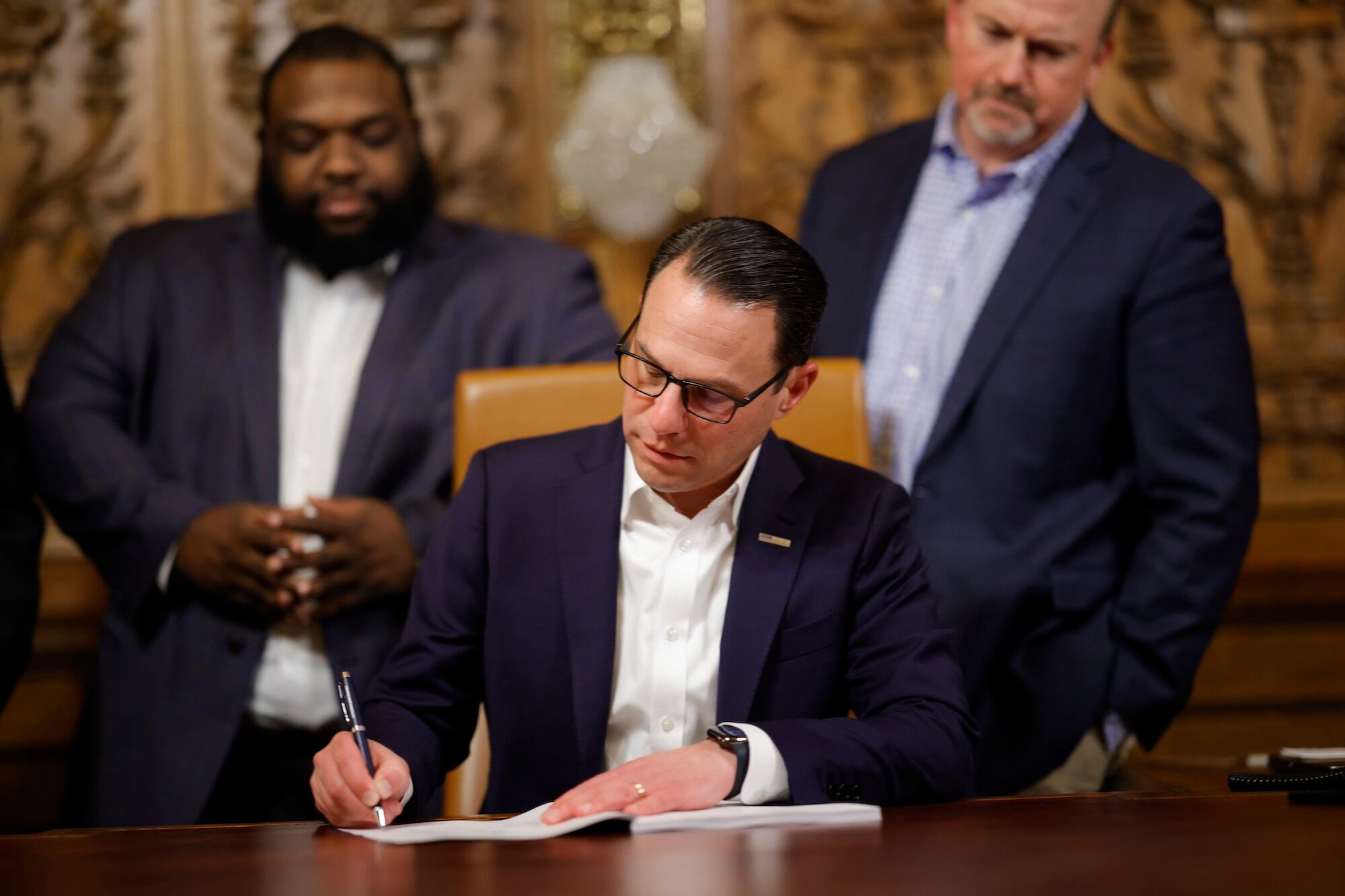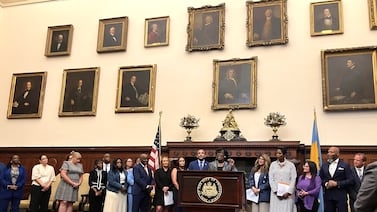Spotlight PA is an independent, nonpartisan, and nonprofit newsroom producing investigative and public-service journalism that holds power to account and drives positive change in Pennsylvania. Sign up for our free newsletters.
HARRISBURG — Pennsylvania’s budget impasse ended Wednesday after the divided state legislature agreed to send millions of dollars to community colleges and libraries, fund public legal defense, and create a student teacher stipend.
Three budget-enabling code bills, plus dozens of other pieces of legislation, passed with broad bipartisan support during a swirl of late-night votes and were sent to Gov. Josh Shapiro’s desk.
The flurry of action marked a sudden end to five-and-a-half months of deadlock that divided the Democratic-controlled state House and the Republican-controlled state Senate and ground the gears of government to a halt.
The budget bills create a handful of new programs, many of which had been prioritized by state House Democrats, including ones that would more than triple the size of Pennsylvania’s child care tax credit and add preventative dental care to the state’s Medicaid program.
“We are collectively showing that we can move past the partisan politics, have real conversations and get a lot done for the good people of Pennsylvania,” Shapiro, a Democrat, said Wednesday night shortly before signing the bills.
Negotiations over these parts of the budget broke down this summer after Shapiro agreed to veto $100 million for private school vouchers favored by Republicans in order to win support from state House Democrats for the main budget bill.
At the time, the Shapiro administration said it would hold off on spending about $1.1 billion until it received additional authorization from the legislature.
This week’s deal leaves out some high-profile programs lawmakers had initially agreed to in their summer agreement, which had been caught in the spending delay.
Most prominently, the popular Whole-Home Repairs Program — which provides grants to property owners who need to fund expensive maintenance projects like fixing leaky roofs — was not given the $50 million lawmakers agreed to spend earlier this year.
Other programs caught in the code bill delay — such as the stipends, indigent defense funding, and state allocations to community colleges and libraries — ultimately received funding, though the delay caused hardships. Some nonprofits that benefit from the PA Workwear program and provide clothing to Temporary Assistance for Needy Families recipients had to lay off staff while they waited for the code fight to resolve.
Wednesday’s deal marks the conclusion of months of talks, a resolution that lawmakers in both major parties celebrated.
State House Speaker Joanna McClinton (D., Philadelphia) said she is grateful the budget is finished and looks forward to the next one, “because the good news is we’re just getting started.”
The programs that didn’t make it into the final deal, like Whole-Home Repairs, were often casualties of last-minute horse-trading rather than concerted opposition.
Despite being swamped with demand since it was created last year using federal stimulus dollars, funding for Whole-Home Repairs will “lapse” until lawmakers return to the budget negotiating table next year, state Senate Majority Leader Joe Pittman (R., Indiana) told reporters Wednesday night.
It could make a comeback then. State Sen. David Argall (R., Schuylkill), who helped champion the proposal last year, said he supports the repair grants and is looking ahead to next year’s budget talks to restore funding.
“It just got lost in the shuffle with all of the other competing programs,” Argall told Spotlight PA.
The final deal also does not route $100 million in additional state aid to Pennsylvania’s poorest school districts, a program known as “Level Up.” Instead, the legislature reallocated those dollars to a state board to fund school construction projects. Another $75 million was allocated to remove lead, asbestos, and other toxins from schools.
State Rep. Pete Schweyer (D., Lehigh) said in a statement that the $175 million marks “the first time in nearly a decade” that “funding passed by the House will give school districts the necessary resources to make the building upgrades.”
Supporters of alternatives to public schools also got a win, as the final education code added $150 million to two related state tax credits for businesses that fund private school scholarships. But for the first time, schools will be required to report data on scholarship recipients’ grade level, disability status, and original public school district, among other data points.
Some of the new proposals that made it into the final code deal were unexpected.
One of the biggest changes, which emerged publicly late in lawmakers’ talks, was the expansion of the state tax credit created last year that allows parents to deduct child care costs from their state taxable income.
The current state credit is capped at 30% of the value of the federal credit, which means it can give caregivers a maximum of $315 annually for a single dependent under 13 or $630 for two or more children, depending on income level.
Under the new law, parents can receive a refundable tax credit equal to their federal child care deduction starting in 2024. That amount can be up to $1,050 for one dependent under 13 and $2,100 for two or more, depending on income.
Child care costs vary by location and the child’s age, but according to federal Department of Labor data, amounts can range from $6,000 to $14,000 a year for Pennsylvania families.
The deal also restarts dental care for hundreds of thousands of Pennsylvanians receiving medical assistance. These benefits had been stripped down to only medically necessary care for adults, such as exams, X-rays, and tooth extractions, but usually excluded other surgeries like root canals.
“As the saying goes, when you smile, the whole world smiles back at you,” state Rep. Valerie Gaydos (R., Allegheny) said on the state House floor Tuesday, when the chamber passed a standalone proposal to reintroduce dental care.
The deal also increases a surcharge on phone bills to pay for 911 dispatching infrastructure. The fee will increase by 30 cents in 2024 to $1.95 before it disappears in 2026.
The County Commissioners Association of Pennsylvania called the increase “far short of properly funding” the service.
One last budget item remains unfinished. A bill that would give $31.6 million to the University of Pennsylvania’s veterinary school, the commonwealth’s only such school, fell 12 votes short of the two-thirds vote needed to approve the allocation.
The bill was sunk by GOP opposition, which state House Minority Leader Bryan Cutler (R., Lancaster) attributed to the school’s recent controversy. The university’s former president, Liz Magill, resigned after testifying before Congress regarding antisemitism on college campuses. Members of Congress and alumni called for Magill’s resignation after she defended allowing genocidal language on campus, saying that such language was allowed as free speech.
“Our institutions of higher education have become an unfortunate home for hate,” Cutler said.
Other unfinished business may have to wait until next year.
For instance, the final package did not contain a boost to state public transit funding through a sales tax transfer, a measure backed by both Democrats and Republicans. SEPTA had pushed for such a measure throughout the fall to avoid reducing service, citing dwindling federal stimulus dollars and low ridership.
“We have the ability to keep advocating for this transit system,” state Rep. Morgan Cephas (D., Philadelphia) and chair of the city’s delegation told Spotlight PA. “And that’s something that we’ll be focusing on in the next fiscal cycle.”
Spotlight PA’s Kate Huangpu contributed reporting.
Correction: This story has been updated to reflect that Pennsylvania’s current child care tax credit is worth 30% of the federal credit, and that the just-passed budget code will increase its value to match 100% of that federal credit, for a maximum value of $2,100 annually.
BEFORE YOU GO… If you learned something from this article, pay it forward and contribute to Spotlight PA at spotlightpa.org/donate. Spotlight PA is funded by foundations and readers like you who are committed to accountability journalism that gets results.







